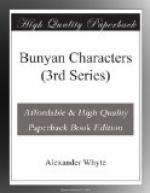2. ‘What religion is he of?’ asks Dean Swift. ‘He is an Anythingarian,’ is the answer, ’for he makes his self-interest the sole standard of his life and doctrine.’ And Archbishop Leighton, a very different churchman from the bitter author of the Polite Conversations, is equally contemptuous toward the self-seeker in divine things. ’Your boasted peaceableness often proceeds from a superficial temper; and, not seldom, from a supercilious disdain of whatever has no marketable use or value, and from your utter indifference to true religion. Toleration is an herb of spontaneous growth in the soil of indifference. Much of our union of minds proceeds from want of knowledge and from want of affection to religion. Many who boast of their church conformity, and that no one hears of their noise, may thank the ignorance of their minds for that kind of quietness.’ But by far the most powerful assault that ever was made upon lukewarmness in religion and upon self-seeking in the Church was delivered by Dante in the tremendous third canto of his Inferno:—
Various
tongues,
Horrible languages, outcries of
woe,
Accents of anger, voices deep and
hoarse,
With hands together smote that swelled
the sounds,
Made up a tumult that for ever whirls
Round through that air with solid
darkness stain’d,
Like to the sand that in the whirlwind
flies.
I then, with error yet encompass’d,
cried,
’O master! What is this
I hear? What race
Are these, who seem so overcome
with woe?’
He then to me: ’This
miserable fate
Suffer the wretched souls of those
who lived
Without or praise or blame, with
that ill band
Of angels mixed, who nor rebellious
proved,
Nor yet were true to God, but for
themselves
Were only. Mercy and Justice
scorn them both.
Speak not of them, but look and
pass them by.’
Forthwith, I understood for certain
this the tribe
Of those ill spirits both to God
displeasing
And to His foes. Those wretches




